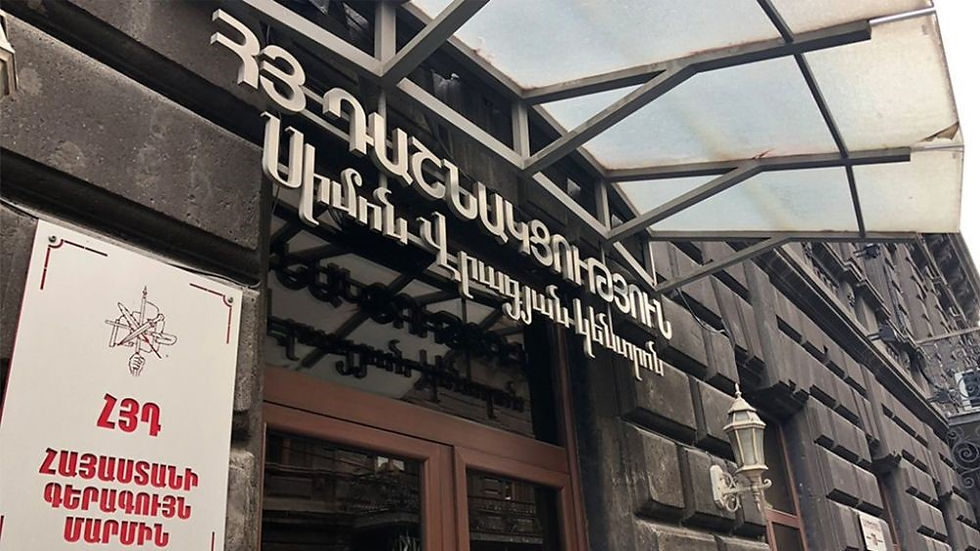ARF Accuses Pashinyan of Planning More Concessions to Azerbaijan
- Aug 20, 2025
- 3 min read

The Armenian Revolutionary Federation (Dashnaktsutyun), a major opposition party in Armenia, has accused Prime Minister Nikol Pashinyan of preparing to make further territorial concessions to Azerbaijan. The accusations come after peace talks held in Washington earlier this month between Pashinyan and Azerbaijani President Ilham Aliyev. The meeting was hosted at the White House on August 8 by U.S. President Donald Trump.
The talks led to the initial signing of a peace treaty between Armenia and Azerbaijan. During the discussions, Pashinyan agreed to give the United States exclusive rights to a transit corridor through Armenia, something Azerbaijan had been demanding. But only hours later, Aliyev said the treaty would be signed only if Armenia changes its constitution.

Despite this, Pashinyan told the Armenian public in a televised address on Monday that “peace has been established between Armenia and Azerbaijan.” He did not mention Azerbaijan’s demand for constitutional changes. He also downplayed the fact that the draft agreement does not address the release of Armenian prisoners in Azerbaijan or clarify how the two countries’ shared border will be drawn.
In his speech, Pashinyan said: “The new logic of peace is that when saying that there are sovereign territories of Armenia that are currently under Azerbaijani control, we must also say that there are sovereign territories of Azerbaijan that are under our control, and this mutual issue must be resolved in the delimitation process.”
This statement led opposition leaders to accuse him of preparing to hand over more land to Azerbaijan without securing anything in return. Ishkhan Saghatelyan, the head of Dashnaktsutyun’s governing body in Armenia, wrote on Facebook that Pashinyan’s remarks were “meant to prepare for these new concessions.” He added that “Pashinyan essentially announced that Azerbaijani troops will not withdraw from the occupied territories [of Armenia].”

Kristine Vardanyan, a Dashnaktsutyun member of parliament, also accused Pashinyan of legitimizing “Azerbaijani territorial claims” to Armenia. She argued that “Azerbaijan has turned all its demands and preconditions into an agreement, whereas those who represent the Armenian side have failed to gain anything in return.”

The Armenian government has already been criticized for the way it handled border issues. Last year, Pashinyan gave four border areas to Azerbaijan. This led to big protests in Yerevan. Opposition groups said the land transfer would only encourage Azerbaijan to demand more.
The draft peace treaty, released on August 11, states that Armenia and Azerbaijan will recognize each other’s territorial integrity. It refers to the 1991 Alma-Ata Declaration, when the newly independent former Soviet republics agreed to respect their Soviet-era borders. Pashinyan described this reference as a strong safeguard for peace.
However, Azerbaijan has previously questioned the legal weight of the Alma-Ata Declaration. Last October, its Foreign Ministry said the declaration “has nothing to do with the question of where the borders of CIS member states lie and which territories belong to which country.” Armenia expressed concern at the time, warning that this could mean Azerbaijan still has territorial claims against it.
Armenia’s opposition is skeptical of the peace process. The Hayastan alliance, of which Dashnaktsutyun is a part, said on August 12 that Pashinyan’s deals with Aliyev and Trump will not bring lasting peace. Instead, it warned that the agreements could create a “new existential threat” to Armenia, especially given Azerbaijan’s prior military attacks on Artsakh, campaigns of ethnic cleansing, months-long blockades, and destruction of Armenian cultural heritage.
—
Support independent reporting from the region by subscribing to The Armenian Report. Our team is funded solely by readers like you.






Comments